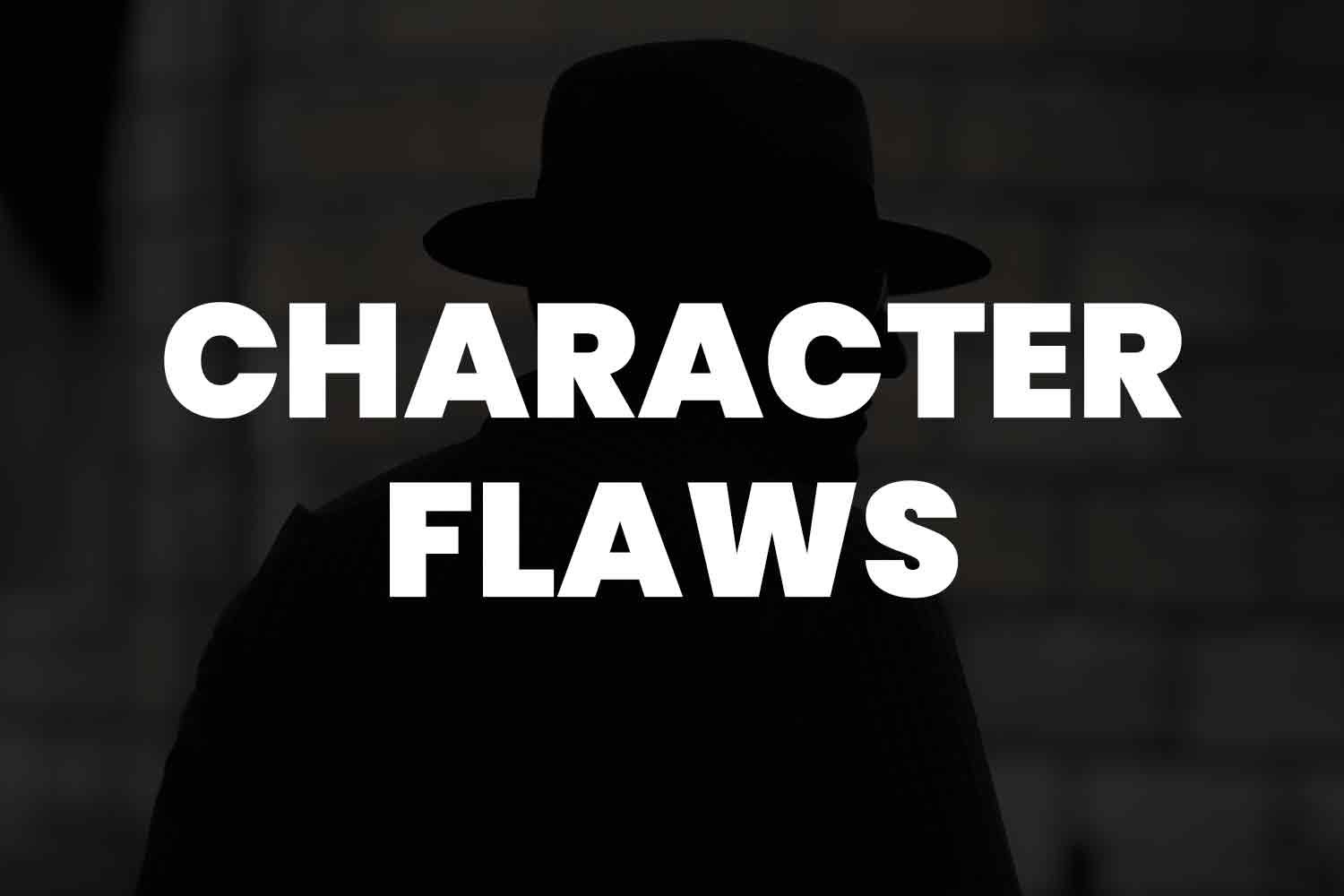A List Of 101 Character Flaws For Your Next Story
Creating compelling characters is the heartbeat of any memorable story. Characters with depth, humanity, and complexity can elevate a plot and leave an indelible mark on the reader's soul. But what is it that makes characters resonate so authentically? Often, it's their flaws.
Just like real people, fictional characters are never perfect. They wrestle with their own weaknesses, insecurities, and imperfections, making them fascinating and relatable. In the world of storytelling, these imperfections are not just quirks; they are windows into a character's soul.
In this blog, I've curated an expansive list of 101 interesting character flaws to breathe life into your next protagonist, antagonist, or supporting character.
From major character flaws to minor quirks, this list is a treasure trove of inspiration for writers looking to create characters that are as flawed and unique as real people.
a long list of Character flaws
1. Overbearing Confidence: A character's flaw that leads them to ignore warnings or underestimate others.
2. Terrible Hygiene: Neglecting personal cleanliness may alienate friends or family.
3. Excessive Desire for Wealth: Greed drives the character, potentially leading to morally questionable actions.
4. Extreme Social Anxiety: A unique character flaw that affects how a character interacts with others.
5. Fear of Stray Animals: An irrational fear that can control the character's life.
6. Breaking Promises Regularly: Erodes trust in relationships.
7. Financially Irresponsible: Living beyond means or mishandling money.
8. Self-Righteousness: An attitude of moral superiority that can be off-putting to others.
9. Irrational Fear of Failure: Paralyzing the character from taking any risks or trying new things.
10. Physical Flaw - Crooked Nose: Influences self-perception and how others view the character.
11. Over-Indulgence in Other People's Business: An annoying habit that strains relationships.
12. Lack of Self-Control: May lead to anger outbursts or impulsive decisions.
13. Self-Sabotage in Relationships: A destructive pattern affecting personal connections.
14. Chronic Latecomer: Reflects a lack of respect for others' time.
15. Weak-Willed: Easily influenced by others, lacking personal conviction.
16. Flawed Professional Ethics: Compromising morals in a workplace environment.
17. Bad Habit of Swearing Excessively: Displays a lack of self-control in language.
18. Misplaced Trust in Unworthy Individuals: Leads to repeated disappointments.
19. Physical Flaw - Missing Limbs: Affects daily life and how others perceive the character.
20. Passive Aggressive Insults: Creates hidden tension in relationships.
21. Self-Hatred: A painful internal struggle affecting self-worth.
22. Moral Death: A profound loss of ethical direction, leading to a negative arc.
23. Ill-Tempered: Easily angered or frustrated.
24. Obsession with Perfection: Strives to create perfect characters and fails to accept any flaws.
25. Takes Advantage of Others' Kindness: A significant flaw in interpersonal relationships.
26. Obsession with Being a Memorable Protagonist: Driven by ego and desire for fame.
27. Inability to Accept Bad News: Denial can lead to poor decision-making.
28. Constantly Inflicting Pain on Others: Physically or emotionally destructive.
29. Ignoring Common Sense: Repeatedly making unwise decisions.
30. Excessive Meddling in People's Business: Overstepping boundaries.
31. Unwillingness to Admit Own Weaknesses: Stifles character development.
32. Unresolved Issues from Character's Backstory: Influences current behavior and decisions.
33. Obsessive Compulsive Disorder: A major character flaw affecting daily routines.
34. Good Character Flaws - Excessive Generosity: Creates financial or personal imbalance.
35. Multiple Personality Disorder: Struggling with multiple flaws and identities.
36. Chronic Liar: Even when unnecessary, lies become part of the character's personality.
37. Fatal Flaws - Uncontrollable Jealousy: Can lead to the character's downfall.
38. Fanatical about One Character: Obsession leads to isolation from others.
39. Unrealistic Dreamer: Chasing unattainable goals.
40. Negative Arc - Becoming Increasingly Isolated: A tragic character development.
41. Physically Destructive when Angry: Damaging objects or even people.
42. Personality Flaws - Narcissistic Tendencies: A focus on self to the exclusion of others.
43. Major Flaws in Judgment: Misjudging situations or people with serious consequences.
44. Excessively Shy: Struggles to interact with other characters.
45. Addiction to Gambling: Risking financial stability and relationships.
46. Cannot Keep a Secret: Major flaw that affects friendships and trust.
47. Afraid of Commitment: Avoids deep relationships or long-term responsibilities.
48. Inability to Express Emotions: Struggles with sharing feelings; may appear cold.
49. Extreme Perfectionism: Never satisfied; everything must be flawless.
50. Minor Character Flaw - Always Losing Items: A quirky but frustrating trait.
51. Tendency to Procrastinate: Avoids tasks until the last possible moment.
52. Lack of Empathy: Struggles to understand or care for others' feelings.
53. Compulsive Thief: Even stealing inconsequential items; a troubling habit.
54. Excessive Dependence on Technology: Alienating others or losing basic skills.
55. Fatal Flaw - Hubris: Excessive pride leading to inevitable failure.
56. Unhealthy Obsession with Appearance: Valuing looks over substance.
57. Moral Rigidity: Inability to see shades of gray in ethical dilemmas.
58. Unable to Accept Help from Others: A prideful character trait.
59. Constantly Seeking Approval: Bases self-worth on others' opinions.
60. Allergic to Animals: A physical flaw that complicates life in unexpected ways.
61. Refusal to Forgive: Holds grudges, poisoning relationships.
62. Easily Distracted: A minor flaw that affects focus and productivity.
63. Excessively Paranoid: Sees threats everywhere, real or imagined.
64. Blind Loyalty to a Flawed Character: Unable to see the truth about a close friend or family member.
65. Major Character Flaw - Betrayal: A devastating breach of trust.
66. Compulsion to Make Everything a Competition: Damaging to personal connections.
67. Inability to Say No: Overwhelmed by commitments; neglects personal needs.
68. Too Trusting of Other Characters: Naive and often deceived.
69. Obsession with Physical Flaws: Focuses on minor imperfections.
70. Struggling with Terrible Hygiene: Affects self-esteem and how others view the character.
71. Character's Flaws Stem from Traumatic Past: Influences all aspects of life.
72. Obsession with Creating a List of Character Flaws: Unusual focus on imperfections.
73. Pessimistic Outlook: Sees the worst in every situation.
74. Unrealistic Expectations of Others: Continually disappointed by other characters.
75. Fears Own Success: Self-sabotages opportunities.
76. Inability to Adapt to Change: Struggles with new circumstances or technologies.
77. Extreme Phobia - Snakes, Heights, etc.: Controls life and limits experiences.
78. Overly Critical of Self and Others: Driven by a misguided sense of perfectionism.
79. Unhealthy Attachment to Objects: Hoarding or assigning undue emotional value.
80. Major Character Flaw - Cruelty: Enjoys causing pain or distress to others.
81. Inability to Follow Through: Starts many projects but completes few.
82. Lack of Common Sense in Daily Decisions: A significant flaw in judgment.
83. Compulsive Need to Be the Main Character: Seeks attention at all costs.
84. Self-Centered World View: Inability to see things from others' perspectives.
85. Minor Flaw - Loves Bad News: Takes pleasure in others' misfortunes.
86. Repeats Mistakes: Fails to learn from past experiences.
87. Lack of Professional Ethics in Work: Damages reputation and trust.
88. Fear of Intimacy: Avoids deep relationships; affects character development.
89. Impulsive Shopper: Buys without need; financially irresponsible.
90. Afraid of Responsibility: Avoids leadership roles or significant commitments.
91. Compulsion to Save Stray Animals: A good character flaw with challenging consequences.
92. All Talk, No Action: Fails to back up words with deeds.
93. Obsessed with Being Right: Cannot admit mistakes or accept differing opinions.
94. Unwilling to Take Risks: Misses opportunities for growth.
95. Fear of Aging: Obsessive behaviors to avoid signs of aging.
96. Inability to Accept Compliments: Struggles with self-esteem.
97. Compulsive Lying, Even When Unnecessary: Erodes trust in all relationships.
98. Fatal Flaw - Inability to Love: Damages all personal connections.
99. Physical Flaw - Chronic Illness: Affects daily life and interactions with others.
100. Lack of Ambition: Content with mediocrity; lacks drive.
101. Too Quick to Trust: Often betrayed or taken advantage of.
Conclusion
A well-crafted character flaw can be a storyteller's secret weapon. It's the element that injects humanity into a fictional being, allowing readers to see themselves in the story.
With this list of 101 interesting character flaws, you're equipped with a rich palette to paint your characters with authenticity and depth.
Whether you choose to imbue your main character with a fatal flaw that defines their tragic downfall or sprinkle minor flaws across other characters to add texture and realism, you're enhancing the storytelling experience.
Remember, it's often in our imperfections that our true selves shine. Let your characters be flawed, let them struggle, grow, and even fail at times.
In doing so, you're not just writing a story; you're reflecting the nuanced tapestry of human existence.
Happy writing!
Frequently Asked Questions About Character Flaws
What Are Character Flaws?
Character flaws are imperfections, weaknesses, or defects in a character's personality. They add depth and complexity to fictional characters, making them more relatable and human-like. From major character flaws that define a character's arc to minor flaws that provide subtle nuances, these aspects are essential in storytelling.
Can You Name Some Common Character Flaws?
Sure! Here's a character flaws list:
Major flaws: Greed, envy, arrogance.
Physical flaws: Crooked nose, missing limbs.
Personality flaws: Self-centered, ill-tempered.
Minor flaws: Bad habits like biting nails, and breaking promises.
Unique character flaws: Extreme social anxiety, terrible hygiene.
What Is a Fatal Flaw?
A fatal flaw is a significant imperfection that leads to the character's downfall in a story. It's usually a moral or ethical weakness that proves to be the character's undoing.
How Do Flaws Work in Character Development?
Flaws are crucial in character development. They make characters feel real and flawed, providing growth opportunities and leading to positive or negative arcs.
Can Characters Have Good Flaws?
Yes! Good character traits, like excessive desire to help others or misplaced trust, may be seen as virtues in some contexts but can create conflict or challenge for the character.
How Do Flaws Reflect a Character's Backstory?
Flaws often stem from a character's backstory. For example, a character who swears excessively might have grown up in a rough environment, while financially irresponsible behavior might stem from a lack of understanding of money's value.
What's the Role of Physical Flaws?
Physical flaws, like a crooked nose or missing limbs, add depth to the character's life and appearance. They can influence how other characters perceive them, sometimes leading to passive-aggressive insults or even self-sabotage.
Can Flaws Be Overcome?
Certainly! A character arc may involve overcoming flaws, turning weaknesses into strengths, or coming to terms with them. Even a flawed character can learn self-control, stop inflicting pain, and exhibit professional ethics.
What About Flaws in Other Characters?
Other characters in a story may have their flaws too. These can create conflicts, and relationships and drive the plot forward, whether they are major character flaws or quirks.
How Can I Create Memorable Protagonists with Flaws?
Create memorable protagonists by combining both major and minor character flaws. Make them relatable by adding common sense, allowing them to have their own weaknesses, and avoiding making perfect characters. Balance their flaws with virtues and ensure they are relevant to the plot and the character's personality.
Can Character Flaws Lead to Positive Outcomes?
Yes! A significant flaw may lead to growth, wisdom, and a positive transformation. Even self-hatred can become self-acceptance, and others' kindness can heal old wounds.
Where Can I Find Examples of A Character Flaw?
You can find examples of character flaws in literature, films, and television shows. Look for characters who take advantage of others, have a bad sense of something, or are physically destructive. Even the main character in well-known stories often has flaws that make them more compelling.






























